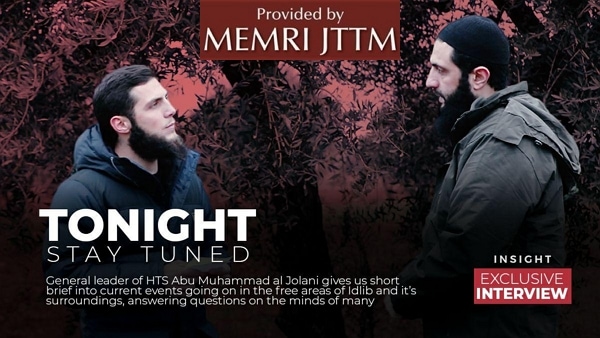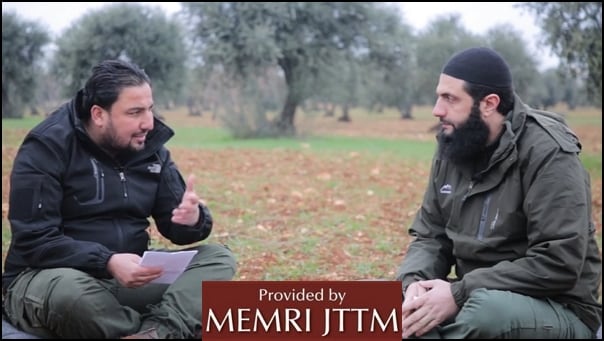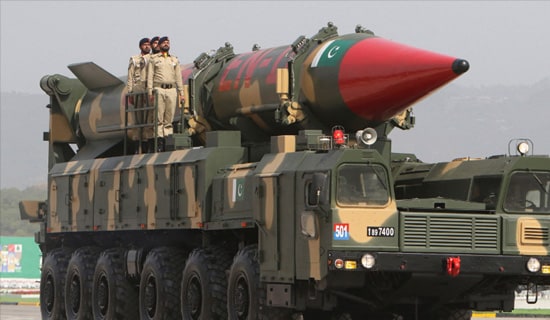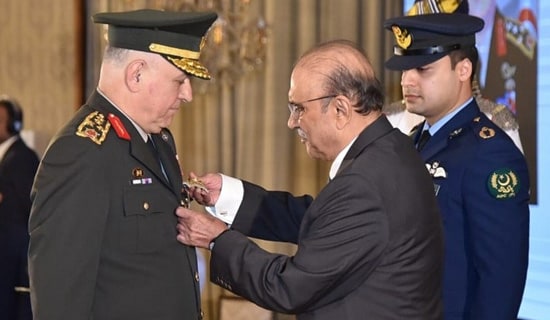The following report is now a complimentary offering from MEMRI's Jihad and Terrorism Threat Monitor (JTTM). For JTTM subscription information, click here.
Since the beginning of February 2020, Hay'at Tahrir Al-Sham (HTS) leader Abu Muhammad Al-Joulani has dramatically increased his appearances in the media. Al-Joulani, the leader of the largest jihadi faction in Syria's last remaining rebel stronghold, the Idlib region, appeared in an official HTS video released on February 5, 2020, followed by two video interviews with pro-jihadi journalists in Idlib, both provided on February 15, 2020. Prior to these media appearances, Al-Joulani had appeared in an HTS video on December 25, 2019 and before that at a press conference held in August 2019.[1] The increase in Al-Joulani's media appearances comes as rebels in the Idlib region face a relentless campaign by the Assad regime, backed by its Russian and Iranian allies, to regain control of the area. In recent weeks, regime forces have made significant advances in the countryside southwest of Aleppo and southeast of Idlib, finally gaining control of the entire strategic M5 highway, which runs from Damascus to Aleppo, on February 11, 2020.
Ebaa News Agency, an official HTS media outlet, released a short video clip on February 1, 2020, that portrays members of the HTS Red Headbands elite forces as they are about to carry out an inghimasi (raid behind enemy lines) attack on regime forces. In the presence of Al-Joulani and HTS chief religious official 'Abd Al-Rahim 'Atoun, they vow to fight to the death.[2] An HTS video clip released on February 5, 2020, shows Al-Joulani delivering a message to a group of Red Headbands fighters, urging them to fight bravely to the death, and declaring that the Assad regime is weak and would be swiftly vanquished by the mujahideen if Russia and Iran stopped supporting it.[3]
On February 15, 2020, Syrian pro-jihadi journalist Tahir Al-'Umar published a 12-minute video on his Telegram channel in which he interviews Al-Joulani.[4] Later that day, Turkish pro-rebel journalist Abdussamed Dagül released a five-minute YouTube video featuring Al-Joulani answering his questions concerning the reason for recent regime advances in the Idlib area, and the HTS attitude toward the presence of Turkish forces in the area.[5] While both interviews discussed many of the same topics, such as legitimizing the presence of Turkish troops in the Idlib area, different issues were stressed in each. It appears that Dagül's interview, which was subtitled in English and opened with an English-language introduction, was geared toward an audience outside of Syria, while Al-'Umar's, which was completely in Arabic and included a response to accusations made against HTS by rival rebel factions, was aimed at the local population.

The above poster promotes an interview HTS leader Abu Muhammad Al-Joulani (right) gave to Turkish pro-rebel journalist Abdussamed Dagül (left).
This report focuses on the interview with Tahir Al-'Umar, in which Al-Joulani discusses recent rebel losses of territory and the Turkish presence in the Idlib area, and responds to criticism raised by some of the group's detractors, such as accusations that HTS has seized other factions' weapons, prevents its rivals from fighting the regime, and has imprisoned members of rival factions.

The above screenshot from a video published by Syrian pro-jihadi journalist Tahir Al-'Umar shows Al-'Umar (left) interviewing HTS leader Abu Muhammad Al-Joulani.
Recent Rebel Losses Of Territory Were Due To Russian-Iranian Intervention; Today We Are Fighting Occupation; We Need Unified Military Leadership To Prevent Further Losses
In response to Tahir Al-'Umar's question, "What is the reason for the leaders' absence from the media?" Al-Joulani says that the leaders of the rebel factions are unable to speak to the media because they are in their operations rooms occupied with the defense of the Idlib area. However, recognizing the people's right to clarification of the military situation, he promises that military commanders will speak to the media whenever they have a chance.
The HTS leader then explains that the reason for the mujahideen's withdrawal from large areas and their capture by the Assad regime is due to the Russian-backed Astana and Sochi agreements, which allowed the regime to focus its offensives on one area at a time. Al-Joulani warns rebels against believing that any area, even one that appears calm at the moment, such as the northern regions controlled by Turkish and Kurdish forces, are secure and will not eventually be attacked by the regime and its Russian allies. It should be noted that although Al-Joulani condemns the Astana and Sochi talks, he refrains from criticizing Turkey, which is one of the powers that backed the Astana talks.[6]
SUPPORT OUR WORK

Al-Joulani reiterates an assertion he has made several times in the past few months, namely, that the regime's military successes are due only to the backing of Russia and Iran, and that without their help the regime would be easily defeated. "Today we do not speak about the regime that was in the past. Today we speak of Russian and Iranian occupation, because if the Russians and Iranians abandoned this criminal regime, within two weeks, perhaps, all the Syrian lands would be liberated […] Consequently, today we fight against occupation. The revolutionary cause has changed now from a popular revolution against a tyrannical regime into confronting occupation." The HTS leader declares that fighting these "occupying" forces requires patience and persistence, as well as the formation of better trained elite forces.
Another reason for recent rebel losses, according to Al-Joulani, is the rebel factions' lack of organization. Admitting that "all the military factions, including Hay'at Tahrir Al-Sham, need additional organization," the HTS leader estimates that some rebel factions are 60%, 70%, or 80% organized in terms of their control over their fighters and those fighters' levels of training, while others are only 10% or 20% organized. Al-Joulani claims that while HTS is one of the better organized factions, estimating its level of organization at 70%, he acknowledges that this is not sufficient to allow the group to equally defend the approximately six fronts in the Aleppo area and the five southeast of Idlib, which has led to the capture of some of these areas. However, Al-Joulani reassures his audience that the factions have increased their coordination and strengthened their lines of defense, asserting that "all these factions need […] correct military organization and there should be a unified military leadership controlling all the soldiers and equipment located in this arena […] Afterwards, Allah willing, we will repel the largest offensive that can come to the liberated areas." Al-Joulani's reference to a "unified military leadership" obviously refers to one led by HTS, as the most powerful rebel faction in Idlib today.
Al-Joulani rejects the allegation that the factions, or Hay'at Tahrir Al-Sham, "does not throw all its military forces into the current battle with the enemy," asserting that at least 75% of the current battles are being fought by HTS, which he says is active in at least eight of about ten sectors where battles are currently ongoing. Al-Joulani also claims that "the operations rooms meet every day once, twice, or three times."
Turkey's Presence In Idlib Is In The Legitimate Interests Of The Turkish People
In response to the query: "Have the Turks actually entered the line of the confrontations?", the HTS leader responds that Turkey has observation points in the Idlib area, which were attacked by regime forces, and stresses that Turkey has a legitimate interest in the situation in Idlib, since this situation directly impacts the Turkish people economically, politically, security-wise, and militarily. Al-Joulani alleges that "the Russians have never been friends of the Turkish people," explaining that the millennium-old rivalry between Turkey and Russia has led the Turkish people to oppose the Russian presence in Idlib. Al-Joulani predicts that the success of the rebels in Idlib will have a positive impact on all nations in the region, particularly on Turkey. This analysis, which legitimizes Turkey's presence in the region and refrains from criticizing Turkey, which provides support to HTS, was also provided by Al-Joulani in his interview with Dagül.
HTS Has Not Taken Rival Factions' Weapons, Imprisoned Their Fighters, Or Prevented Them From Fighting The Regime
Al-Joulani also responds to accusations leveled against HTS by rival rebel factions, particularly those associated with the National Liberation Front (NLF), which is part of the Free Syrian Army (FSA). The HTS leader denies the allegation that his group has "taken the factions' heavy weapons,"[7] saying that in the past, HTS and the NLF had some disagreements on this issue, and the two sides came to an agreement that the heavy weaponry would be under the control of the NLF official in charge of defense, on condition that it would be employed only against the regime and not against HTS. However, Al-Joulani asserts, since fighting has broken out, all the factions have taken back their weapons.
Al-'Umar mentions another accusation against HTS: "Some say there are thousands of prisoners from the Free Army in the prisons of Hay'at [Tahrir Al-Sham]." Vehemently denying this charge, Al-Joulani responds: "God forbid! My dear brother, there is not a single prisoner [in the custody of] the Security Apparatus or the Criminal Apparatus, for instance, from the Free Army factions. Not at all." The HTS leader claims that all inmates in the group's prisons are either criminal cases; security cases, such as ISIS operatives; or collaborators with the regime.
Al-Joulani denies that HTS is currently preventing any rival factions from entering the Idlib area to help fight the regime, declaring that all factions that want to defend Idlib are present in the area and are participating in the area's defense.
The Jihad In Syria Is A Battle For All Sunnis
In an apparent attempt to gain additional support from Muslims outside of Syria, Al-Joulani concludes the interview with a message to "the mujahideen at the fronts and to our steadfast people and displaced persons in the liberated areas," emphasizing the importance of the jihad in Syria to all Sunnis worldwide and asserting that the battle will soon be over. The HTS leader declares: "I say that this battle, the battle of the people of Syria, is the battle of the Sunnis in general in the entire region. This is a battle in which a very high price was paid. More than a million people were martyred in this land, half of the nation – about 12 million people – were displaced or became refugees, and there are terrible calamities that took place. However, now we are at the end of it. [...] We need more patience and steadfastness, because if this battle is settled – God forbid – not to the benefit of the Sunnis, the Sunnis in this region will become a kind of minority, after they had been the majority of the population in this region."
Al-Joulani reminds the mujahideen fighting in Idlib of their great responsibility to the local population: "We must be patient and steadfast, and the mujahideen must realize that they are fighting while there are millions of people behind them who will be harmed by their retreating and benefited by their advancing. We must know that the responsibility is very great, and we must offer whatever we can, our most valuable possessions, toward the goal of Allah bringing about victory at our hands."
[1] See MEMRI JTTM Reports: Hayat Tahrir Al-Sham Leader Al-Joulani: We Fight The Russian And Iranian Occupation For The Islamic Ummah; Attacks On The Syrian Regime's Economic And Military Targets Must Continue, December 26, 2019; Hay'at Tahrir Al-Sham (HTS) Leader Al-Joulani Declares Rebel Victory In Campaign In Idlib; Insists Regime Will Be Defeated Through Armed Jihad, Not Negotiations, August 5, 2019.
[2] See MEMRI JTTM Report: In The Presence Of HTS Leader Al-Joulani, Elite Fighters Pledge To Fight To The Death Prior To Operation In Aleppo, February 3, 2020.
[3] See MEMRI JTTM Report: Hay'at Tahrir Al-Sham (HTS) Video Features Al-Joulani Urging Mujahideen To Fight Fearlessly, Says If Russia, Iran Abandon Regime, Mujahideen Will Capture Damascus In One Week, February 6, 2020.
[4] Telegram, February 15, 2020.
[5] See MEMRI TV Report: HTS Leader Abu Muhammad Al-Joulani: Mujahideen Forces Are Withdrawing in Order to Reorganize in Face of Overwhelming Russian Military Force; We Will Return to Liberate Syrian Land, February 15, 2020.
[6] The official stance of HTS has been to reject the Astana and Sochi agreements. However, it has offered little concrete resistance to the terms of the agreements, such as allowing Turkish forces into the Idlib area. See MEMRI JTTM Reports: Hay'at Tahrir Al-Sham (HTS) Leader Abu Muhammad Al-Joulani Condemns Syrian Factions Involved In Astana Accord, Urges Jihadi Groups To Unite, January 16, 2018; Following Hay'at Tahrir Al-Sham (HTS) Decision To Grant Turkey A Military Presence In Idlib, Al-Qaeda Supporters Accuse It Of Abandoning Its Principles, Seeking To Ingratiate Itself With The Enemies Of Islam, June 7, 2018; Hay'at Tahrir Al-Sham (HTS) Statement On Sochi Talks Affirms The Group's Commitment To Jihad And Its Refusal To Surrender Weapons, October 15, 2018.
[7] Al-Qaeda's affiliate in Syria made a similar accusation against HTS in January 2019; see MEMRI JTTM Report: HTS Is "Killing The Jihadist Spirit" Claim Al-Qaeda Leaders In Syria, January 31, 2019.




